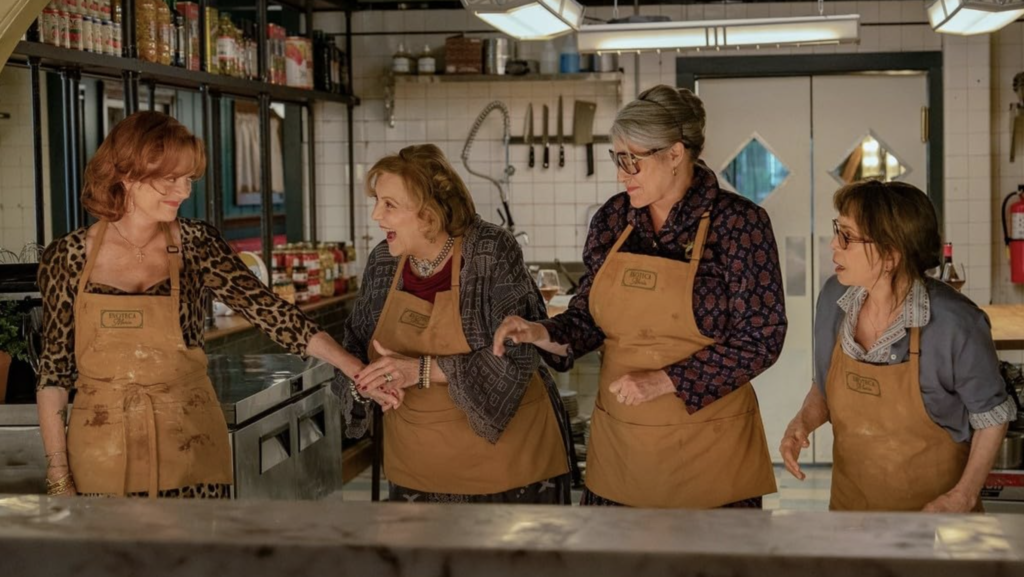An acquaintance of mine, a better Catholic than I, recommended I watch a new movie released directly on Netflix. This streaming service is not usually associated with Catholic-friendly programming, and my friend cautioned me about one particular scene that might disappoint, but based on his high praise for the overall content, I sat down and watched “Nonnas.”
It is a small film, the kind one usually only sees at film festivals or deep down on the Netflix most popular list. There are no car chases, no alien invasion, and there is no super villain within a thousand yards. The cast is not so small and includes Vince Vaughn, Susan Sarandon, and Talia Shire.
From the cave paintings in Lascaux, France, to the next Marvel tentpole movie, human storytelling is about conflict in one form or another. What stands out in this film is the source of the personal conflict: Not just the lead character portrayed by Vaughn, but in all the supporting cast as well. It is not trauma induced by existential violence, hate, or anger, but rather the deeply personal and universal pain of loss.
We first meet Vaughn’s character as a happy little boy running an errand for his mom and his grandma. He returns and watches transfixed as the “Nonnas” of his household pour their love for their family into the making of the Sunday meal in a big Italian family.
We next see this character as an adult, sitting forlornly in the same house during the wake of his now-deceased mother. His loss is palpable. Usually in films like this, there is anger over unresolved conflict and pain, but the anguish this character feels is simply losing someone he loved very much.
Despite the many mournful and brokenhearted moments, the film remains a joy to watch, as Vaughn, a bus mechanic, decides to take his inheritance from his mother and start a restaurant to honor not just his mother and grandmother, but all the “Nonnas” anyone may have ever known.
The film becomes a love letter to the lead character’s deceased mom as he perseveres to build a restaurant and enlists four “Nonnas” who thought their lives were over, only to become the chefs at the restaurant.
As I watched and became more invested in this film, the caveat my friend told me about began to worry me. As a general rule, I am wary of films with a lot of Catholic imagery and references. “Nonnas” is full of them. Some are trite, and some have simplistic beauty, like when the pretty lady at a bakery counter tells Vaughn’s character as a boy not to forget to say his rosary. We see the same woman later in the film, now older and still standing watch at the bakery, urging the now-adult lead character not to forget to pray his rosary.
With my friends’ caveat swirling in my head, I wondered how I could get to the end of this film chock-full of Catholicity without being let down? I felt like the coyote in the old Road Runner cartoons, expecting an anvil to come crashing down on my head at any moment. Halfway through the film, it landed.
It was a scene where the four Nonna chefs gathered in the yet-to-open-restaurant, and there were doubts it would open at all. It was a scene of beautiful bonding between the women where they shared their regrets and losses, and how the restaurant represented a way out of their grief. They had all raised families, now their husbands were deceased, and their children were either dispersed geographically or emotionally.
All but one of the Nonnas… because we learn that the fourth member of this quartet is or was a nun. Her exact status is left ambiguous. But she, too, is dealing with loss — a lost love. When one of the other Nonnas asks his name, the former nun responds: “Isabel.” What follows is a textbook explanation of pop culture sexual ethics where the Church is dutifully chastised for its lack of “charity.” I felt what the film needed most then was a narrator to let the audience know, “We will be rejoining the rest of the film already in progress.”
The rest of the film is a joy. That one scene notwithstanding, “Nonnas” is a movie worth the time, and its celebration of family and decency refreshes. But you are going to be hungry for Italian food afterward.

